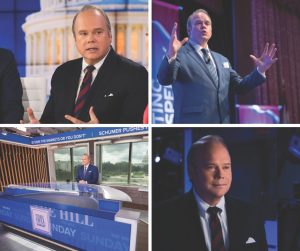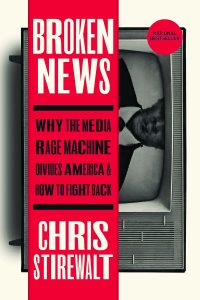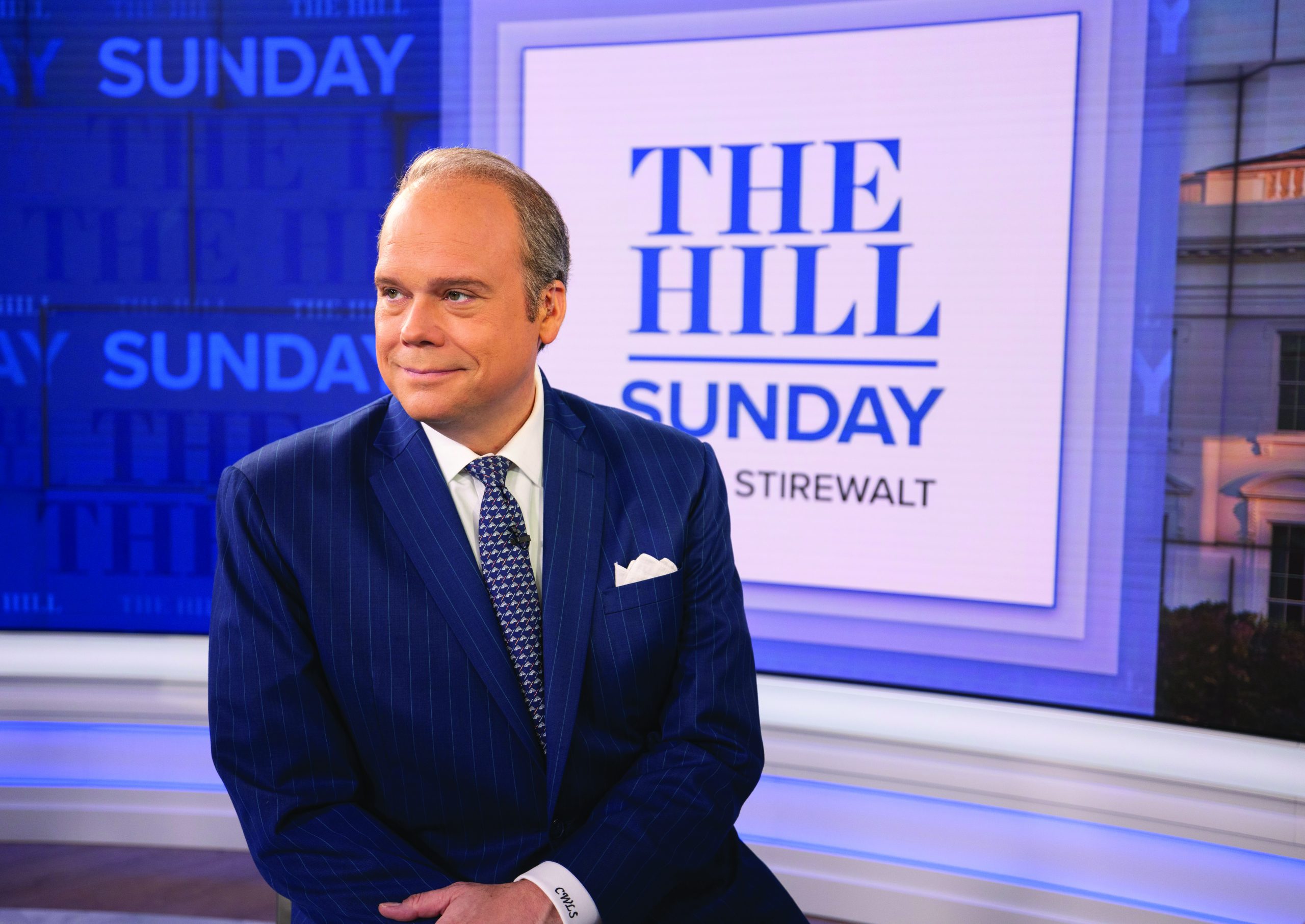Long before cable news devolved into what he calls “brain-dead partisan tribalism” and truth became a casualty of ratings, Chris Stirewalt learned the trade in a smoke-stained newsroom in Wheeling, West Virginia.
“I liked journalism because it let me be the skunk at the garden party,” admitted Stirewalt, who began working for the Wheeling Intelligencer as a sportswriter at age 17. “It was a backstage pass that allowed me to put obnoxious questions to powerful people. I could rake the muck and cause trouble, and I found that very appealing. Of course, I eventually learned that being the skunk at the garden party is not an end unto itself. It only works if it’s in service of the public good.” 
Today, as the political editor at cable network NewsNation, that perspective guides Stirewalt’s call for nonpartisan national discourse. This August, Stirewalt returns to the West Virginia Chamber of Commerce Business Summit to make the case that West Virginia’s founding ideals, rooted in both liberty and cooperation, could help point the way forward.
“West Virginia’s independence and statehood were a proclamation of liberty – liberty for the 55 western counties and liberty for enslaved people,” he said. “That should be sewn into our identity as West Virginians. We are guardians and champions of liberty and of Americanism.”
Sewn into Stirewalt’s own identity is a sincere love for the people of West Virginia, which “shines through in everything he does and says,” noted West Virginia Chamber of Commerce President Steve Roberts.
“It’s not just a topic he covers; it’s deeply ingrained in his character,” Roberts said. “Chris’s success on a national stage is a source of immense pride for us all. Yet, he never forgets his roots in West Virginia. And when he returns it always feels like a homecoming, reminding us of the strong bonds that tie our community together.”
Born in Michigan, Stirewalt moved to Wheeling, West Virginia, at age 2. His father, who worked in the coal industry, relocated around the Industrial Midwest before finally settling in the Mountain State.
“It definitely became home for my family and me,” Stirewalt said. “I like to say that I got to West Virginia as fast as I could.”
After graduating from the Linsly School, Stirewalt pursued a summer job at the Intelligencer. From the moment he stepped into the newsroom, he was hooked.
“The carpet was held together with electrical tape and the circa 1975 word-processing terminals, yellow lacquered by cigarette smoke, required the delicate touch of a bomb technician to operate,” he recalled in his 2022 bestseller Broken News: Why the Media Rage Machine Divides America & How to Fight Back. “The people who worked there were surly about their low pay and long hours, prone to foul language and a love of pitchers of cold beer. I was, of course, immediately in love. I had found my tribe.”
Stirewalt attended Hampden-Sydney College and continued to work summers at the Intelligencer, eventually making the shift from sports to local government and politics. By the time he graduated with a history degree in 1997, he was ready – or so he thought – for the national stage.
“There’s no ego like the young male ego,” he laughed. “I assumed an excited and grateful media world would snatch me up, knowing that I, 21-year-old Chris Stirewalt, was available. Would it be TIME magazine, the New York Times, the Washington Post? Who would be lucky enough? Imagine my surprise when nobody cared that a 21-year-old with a bachelor’s degree had arrived on the job market.”
Humbled but undeterred, Stirewalt returned to the Intelligencer, churning out four to five articles a day for his hometown paper. Soon, his boss and mentor Bob Kelly –“who is of my lifetime the greatest newsman in West Virginia,” Stirewalt remarked – encouraged him to apply at the Charleston Daily-Mail.
“I thought, ‘This is the big time – this isn’t like covering those guys on the county commission,’” recalled Stirewalt, who moved to Charleston in 1998 to write for the Daily-Mail and later for the State Journal. “But what I found out was that the people in the West Virginia Legislature weren’t any different from the folks on the Ohio County Commission – it’s just that instead of their dad owning one filling station, he owned five filling stations. The dollar amounts were a little larger, but human nature remained human nature.”
In 2007, he moved to Washington, D.C., to write for the Washington Examiner. Not long after, he entered the world of TV punditry. It was, by many measures, “the big time.”
“You know what I found out? It was still the same people – just more filling stations,” he said. “The human struggles, the strengths and weaknesses, the corruption and the impulse to do good – it was all the same, and in about the same proportions, as it had been in Charleston.”
As it turns out, he said, if you can cover politics in West Virginia, “which is as full of rascality, corruption, ego and the craziest political stories you’d ever want to see,” you can cover politics anywhere.
“I got a graduate-level education in human nature in West Virginia,” he said. And it serves me well every day.”
In 2010 Stirewalt joined Fox News Channel as part of its Washington bureau and political team. He was soon named political editor and became a familiar face on the network’s daytime programming. He played a central role in shaping Fox’s political coverage and brought a no-nonsense, data-driven approach to the network’s Decision Desk.
However, Stirewalt’s tenure at Fox ended after the 2020 election, when he defended the network’s early (and ultimately accurate) call of Arizona for Joe Biden – a move that drew fire from within and outside the network. Testifying before the House committee investigating the Jan. 6 Capitol attack, Stirewalt emphasized that the call required both confidence in the data and consensus among his team: “We looked around the room, and everybody said, ‘Yeah,’” he recounted to the committee.
In Broken News, he reflected on the incident as emblematic of a broader shift in the news industry. Media outlets had increasingly favored algorithms and ratings over objective reporting – not to serve a political agenda but to maximize profits. He likened the Arizona call to “serving up green beans to viewers who had been spoon-fed ice cream sundaes for years.”

In 2022, Stirewalt joined the media company NewsNation, where he serves double duty as both the political editor and anchor of the public affairs program The Hill Sunday. He is also political editor of the website The Hill, a senior editor at The Dispatch and a senior fellow at the American Enterprise Institute, where he studies public opinion, voting trends and the relationship between media and politics.
What he has found in these organizations is a refreshing commitment to impartiality and a willingness to “take the long way around” to profits, rather than chasing what he calls “rage revenue.”
“A very wise man said a long time ago that an ethic without sacrifice is no ethic,” he said. “In the news business, we must be willing to forego some things that we want and that would be appealing in order to do our duty to the Constitution and to the United States. It means we cannot stir up hatred and division; we cannot lie; we cannot cheat and steal. We cannot do those things because it would dishonor the extraordinary privilege that we have as journalists and the essential role that we play in keeping this country strong and free.”
Stirewalt said if there’s an overarching theme to his work today, it’s this: “There is no American journalism without Americanism.”
“America needs journalists committed to her principles and who take seriously our obligation to facilitate useful discourse in a healthy republic,” he wrote in Broken News.
At the upcoming Business Summit, attendees can expect another lively presentation from Stirewalt, who has no qualms about wading into controversial, complex matters – from his “burning rage against the American primary system” to the country’s “fetishization of college” to whether or not Charleston stole the state capital from Wheeling.
“I don’t know how I keep getting away with talking to you people,” he said. “I love to go; I love to be with my friends. And it’s a good excuse to get me within the confines of the 35th state at least once a year.”
Roberts said that Stirewalt, who’s spoken at numerous Chamber events over the years, is consistently well-
received by Chamber members.
“What truly sets Chris apart as a speaker is his remarkable blend of sharp intellect, engaging humor and profound accessibility,” Roberts said. “He doesn’t just present facts; he tells stories and connects with the audience on a personal level.”
According to Stirewalt, in an age often defined by division and distrust, West Virginia’s business community tells a different story: one where doing well and doing good aren’t mutually exclusive. His hometown stands as proof, he said.
“For Wheeling to be the size that it is and have all those great resources – and to have the sense of purpose and place that it does – is the result of great stewardship,” he said. “Wheeling got rich at the right time and, thank God, fell under the stewardship of people who were interested in preserving all those good things.”
The Business Summit serves as a reminder that the Chamber of Commerce represents more than just economic interest, he added.
“Every time I come back to the Chamber of Commerce in my home state, I am reminded that it is in commerce, in free trade among free people, where folks are helping each other,” he said. “How many people have helped a competitor through a Chamber of Commerce? How many people have said, ‘It would be in my narrow economic interest to watch this person’s business be destroyed, but that’s not what I’m going to do’? That’s not in their narrow interest; that’s an invisible hand guiding them toward something bigger.”
For Stirewalt, that hits home.
“When I talk about the folks who saved Wheeling, who didn’t allow Wheeling to dry up and blow away, who were those people? Those were businesspeople,” he said.
Katherine Pyles is a freelance writer and editor living in Huntington, West Virginia.
